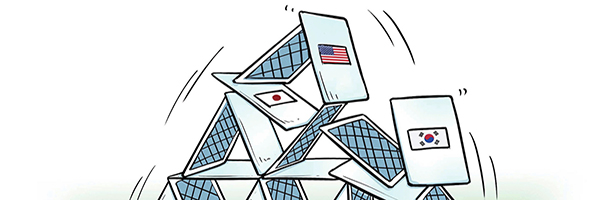US-Japan-South Korea summit to form ‘destructive’ mini NATO structure

With South Korea, Japan and the US eyeing deeper security cooperation in the name of concern over North Korea’s nuclear program, the upcoming summit between the leaders of the three countries at Camp David in Maryland later this week aims to form a “mini NATO” structure that will be destructive to regional security, making the situation more complex with more conflicts, some experts warned on Wednesday.
US Secretary of State Antony Blinken met virtually on Tuesday with his Japanese and South Korean counterparts before US President Joe Biden is scheduled to host Japanese Prime Minister Fumio Kishida and South Korean President Yoon Suk-yeol at Camp David on Friday. The summit – the first time the leaders of the three countries gather specifically for a trilateral meeting – is described by the US official as “a new milestone in trilateral cooperation,” and they are expected to announce plans for expanded military cooperation, according to media reports.
The leaders will discuss and strengthen practical cooperation on a variety of issues, from physical security to economic security, from humanitarian assistance to development finance and from global health to critical and emerging technologies, Blinken said.
However, the US State Department pointed out on Tuesday that China should not see the trilateral summit as “provocative” despite some US media and observers believing that “growing concerns” over the influence of China and the North Korea’s “nuclear threats” are issues to be discussed at the summit.
It is expected to lead to a joint statement that includes “some language speaking to concerns” about the so-called desire of China to change the status of Taiwan island, Reuters reported.
The three countries are expected to reach a consensus on a trilateral security alliance at the summit, and gradually form “a mini NATO” security mechanism for Northeast Asia via specific defense technology sharing and joint military exercises, Li Haidong, a professor at the China Foreign Affairs University, told the Global Times on Wednesday.
“This ‘mini-NATO’ mechanism indeed capitalizes on concerns stemming from missile and nuclear threats on the Korean Peninsula. But the design of the mechanism is not aimed at resolving the existing security dilemma in Northeast Asia,” Li said.
Instead, it seeks to exploit the existing security challenges to establish an alliance framework that would dominate the regional security agenda, which reflects US’ destructive intentions, he noted.
North Korean Defense Minister Kang Sun-nam slammed the US at the 11th Moscow Conference on International Security on Tuesday, who said that Washington is driving the situation in Northeast Asia to the verge of a nuclear war outbreak, Russian news agency TASS reported.
Since the beginning of this year, the US has deployed huge strategic nuclear means to South Korea and has conducted several largest joint military drills imitating a total war with us, the North Korean official said.
South Korea’s Yoon also called for deeper security cooperation with the US and Japan, who even stressed on the “partnership” between South Korea and Japan on the occasion of its Liberation Day on August 15. In the past, South Korean leaders commonly used their speech on this date to urge Japan to make fresh apologies for its aggression during WWII.
Some US observers believe that the Biden administration is seeking to “take advantage” of the Tokyo-Seoul rapprochement to “institutionalize” some of the progress, Reuters said.
Dong Xiangrong, a senior fellow at the National Institute of International Strategy at the Chinese Academy of Social Sciences, told the Global Times on Wednesday that the summit at Camp David is a continuation from the trilateral meeting on the sidelines of the G7 summit Hiroshima in May.
“Following the inauguration of the Yoon administration, there has essentially emerged a triangular pattern featuring Biden-Kishida-Yoon. The frequency of these triangular meetings has indeed exceeded those of the past US-Japan-South Korea trilateral relations,” she said.
Some experts warned that the US, through the trilateral summit, aims not only to establish a new multilateral military group or “mini clique” in the Asia-Pacific region but also seeks to reinforce the so-called economic and technological “new cold war” through an enhanced geopolitical cold war. If the US, Japan, and South Korea truly emphasize such an anti-China geopolitical group, it poses a risk of sabotaging the post-Cold War economic integration process in the Asia region, they said.
However, some experts doubt whether Japan and South Korea have truly reconciled their differences for trilateral cooperation, and if the rapprochement between the two countries can be sustainable.
“As of now, their internal disputes don’t seem to affect the trilateral cooperation among the three countries. Although a relatively divided stance toward Japan within South Korea has already existed, “under the Yoon administration, an official and more pro-Japan, collaborative attitude has largely taken shape,” Dong said.
